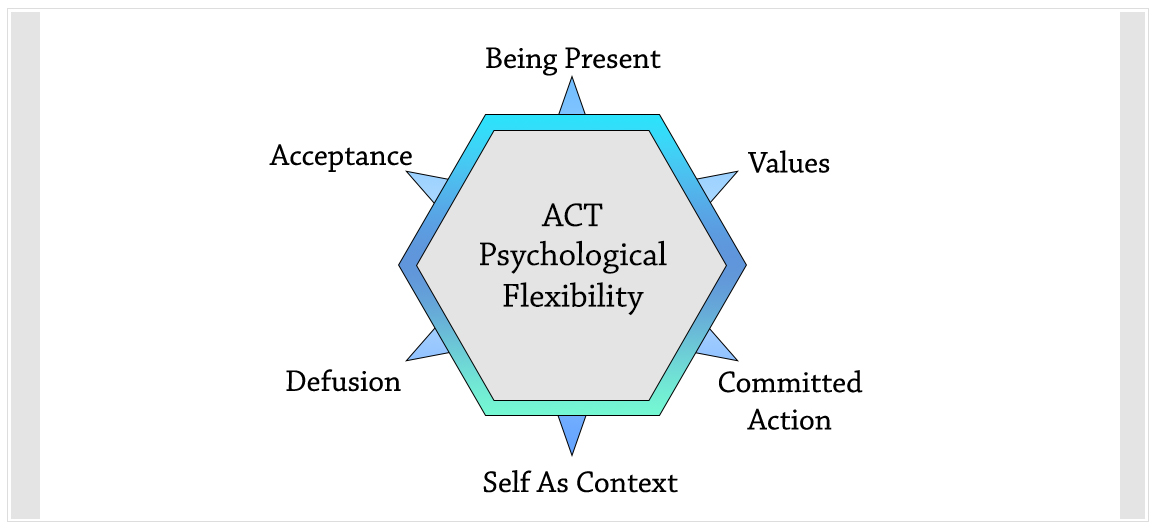
Acceptance and Commitment Therapy (ACT)
Introduction
In today's fast-paced and often stressful world, maintaining mental well-being is more important than ever. Acceptance and Commitment Therapy (ACT) has emerged as a valuable therapeutic approach that empowers individuals to lead fulfilling lives by addressing psychological struggles and promoting mental health. In this article, we will explore what ACT is, its fundamental principles, and the conditions it can help address.What is Acceptance and Commitment Therapy (ACT)?
Acceptance and Commitment Therapy, commonly referred to as ACT, is a modern, evidence-based psychotherapy that blends cognitive and behavioral therapies with mindfulness strategies. ACT aims to help individuals embrace their thoughts and feelings rather than attempting to change or suppress them. It encourages individuals to take committed actions aligned with their values, even in the presence of challenging emotions or thoughts.
The Core Principles of ACT
- Cognitive Defusion - ACT helps individuals distance themselves from their thoughts and recognize that thoughts are not facts. This technique allows them to respond to thoughts more flexibly and not be dominated by them.
- Acceptance - ACT promotes the idea that struggling against unwanted thoughts or emotions often leads to more suffering. Instead, it encourages individuals to accept these experiences as a natural part of being human.
- Present-Moment Awareness (Mindfulness) - Mindfulness practices are integrated into ACT to increase awareness of the present moment. By being fully present, individuals can better observe their thoughts and emotions without judgment.
- Self-as-Context - This principle helps individuals recognize that they are not defined by their thoughts and emotions. They are the observers of these internal experiences.
- Values Clarification - ACT encourages individuals to identify their core values and what truly matters to them in life. These values become the compass guiding their actions.
- Committed Action - ACT emphasizes taking steps toward one's values, even when faced with discomfort or challenges. It promotes a focus on actions that align with personal values, allowing individuals to lead meaningful lives.
Conditions ACT Can Help Address
ACT has shown efficacy in treating a wide range of mental health conditions and challenges, including:
- Anxiety Disorders - ACT helps individuals confront and manage anxious thoughts and sensations by teaching them to accept their anxiety without judgment while taking actions consistent with their values.
- Depression - ACT addresses depressive symptoms by helping individuals identify values and engage in activities that bring a sense of purpose and fulfillment.
- Chronic Pain - For individuals dealing with chronic pain, ACT can improve their quality of life by helping them accept the pain and commit to actions that lead to a more fulfilling life despite it.
- Substance Abuse - ACT helps support individuals with overcoming substance abuse by helping them understand the underlying causes. ACT helps encourage commitment to a substance-free life in line with personal values.
- Stress and Burnout - ACT equips individuals with tools to manage stress more effectively by fostering mindfulness and values-driven actions.
- Trauma and Post-Traumatic Stress Disorder (PTSD) - ACT can be integrated into trauma therapy to help individuals come to terms with their traumatic experiences and rebuild their lives in alignment with their values.
Conclusion
Acceptance and Commitment Therapy (ACT) is a contemporary therapeutic approach that empowers individuals to lead more meaningful, value-driven lives while effectively managing psychological struggles. By embracing acceptance, mindfulness, and committed action, individuals can overcome a wide range of mental health challenges, from anxiety and depression to addiction and trauma. If you're seeking a therapy approach that focuses on long-term well-being and personal growth, ACT may be the right choice for you. Contact Attend Mental Health to explore the best treatment options tailored to your unique needs.Back to Our Treatment Focus
